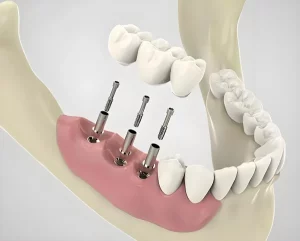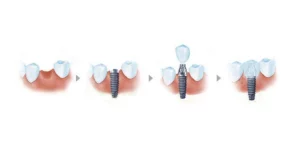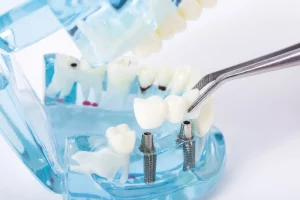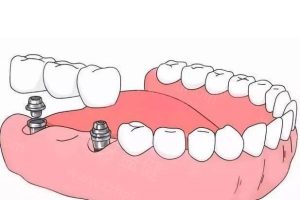When discussing how to alleviate dental implant pain, it’s important to first understand the basic procedure of dental implantation, the potential causes of pain, and strategies tailored to different stages and individual differences. Dental implant surgery, known as implant placement in oral implantology, aims to restore the function and aesthetics of missing teeth by biologically integrating artificial tooth roots (implants) with the jawbone. Although this technology is well-established and boasts a high success rate, post-operative pain remains a concern for many patients. This article will thoroughly explain how to effectively relieve dental implant pain by addressing four key areas: pre-operative preparation, intraoperative control, post-operative care, and specialized pain management.

Causes of Post-Operative Pain from Dental Implants
Post-operative pain from dental implants is often caused by surgical trauma and infection. The surgery itself, as a traumatic procedure, can damage local soft and bone tissues, leading to short-term pain and swelling, which typically subsides as the wound heals. However, if nearby nerves are damaged due to improper operation, it may cause persistent pain. Additionally, infection around the implant or poor oral hygiene after surgery can exacerbate pain and swelling, requiring prompt treatment with antibiotics.
Other causes of pain may include inflammatory conditions such as gingivitis, periodontitis, and pulpitis. Inadequate post-operative care, long-term neglect of oral hygiene, and insufficient sterilization of medical instruments can all trigger these inflammations. Furthermore, improper integration between the implant and bone, medication side effects, and individual differences can also influence the perception of pain. Therefore, patients should take appropriate measures under the guidance of their dentist to relieve pain and promote recovery based on their individual conditions.
How to Relieve Dental Implant Pain
- Pre-Operative Preparation
1.1 Understanding the Procedure: Before deciding to undergo dental implant surgery, patients should fully understand the steps of the procedure, potential risks, and expected outcomes. This knowledge can help reduce anxiety and fear stemming from the unknown, thereby lowering the perception of psychological pain.
1.2 Health Evaluation: A comprehensive health check is necessary before surgery, especially for chronic conditions like diabetes and hypertension, which can affect recovery and pain management. Controlling these conditions can reduce post-operative complications, including heightened pain.
1.3 Discontinuing Certain Medications: Patients should inform their dentist of any medications they are taking, particularly anticoagulants and NSAIDs, as these may affect bleeding during surgery or pain control. The dentist may advise discontinuing some medications in advance.
1.4 Psychological Preparation: Maintaining a positive mindset and engaging in thorough communication with the dentist can help build confidence in the surgery and reduce pain exacerbated by tension.
1.5 Pre-Operative Pain Relief: For particularly sensitive or anxious patients, the dentist may recommend taking pain relievers or sedatives before the surgery to minimize pain during the procedure.
- Intraoperative Control
2.1 Precise Surgical Technique: The experience and skill level of the dentist is crucial for minimizing surgical trauma and reducing post-operative pain. Choosing an experienced implant specialist ensures precise operation and minimal damage to surrounding tissues.
2.2 Local Anesthesia: Dental implant surgery typically uses local anesthesia, which is injected into the surgical area to numb the tissues. Effective anesthesia is key to reducing intraoperative pain, so patients should cooperate with the dentist to ensure proper absorption and diffusion of the anesthetic.
2.3 Minimally Invasive Techniques: With advancements in medical technology, minimally invasive implant techniques are increasingly used. Compared to traditional surgery, minimally invasive procedures cause less trauma, leading to faster recovery and reduced post-operative pain.
2.4 Additional Pain Control: During surgery, the dentist may employ additional pain control methods, such as nerve block anesthesia or intravenous pain medication, to ensure the procedure is painless or minimally painful.
- Post-Operative Care
3.1 Following Medical Advice: Patients should strictly follow the dentist’s instructions post-surgery, taking prescribed antibiotics and pain relievers on time to prevent infection and reduce pain. It is also important to maintain oral hygiene and avoid allowing food particles and bacteria to accumulate in the surgical area.
3.2 Cold and Heat Therapy: In the early stages after surgery, applying cold compresses can reduce swelling and pain. Gently place an ice pack or cold towel on the surgical area for 15-20 minutes at a time, with intervals in between. Once the swelling subsides, switch to heat therapy to promote blood circulation and recovery.
3.3 Diet Adjustments: In the days following surgery, avoid consuming hard, hot, cold, or spicy foods that may irritate the surgical area and exacerbate pain. Soft and easy-to-chew foods, such as porridge, noodles, and steamed eggs, are recommended. Additionally, increasing intake of foods rich in vitamins and protein can help promote wound healing.
3.4 Oral Hygiene: Patients should keep their mouths clean after surgery but avoid excessive brushing or rinsing, which could damage the surgical area. Dentists may recommend specific mouthwashes for cleaning, and patients should brush their teeth gently, avoiding the surgical site.
3.5 Rest: Adequate sleep and rest are essential for recovery after surgery. Patients should avoid excessive fatigue or intense physical activity, which could increase physical stress and pain.
- Specialized Pain Management
4.1 Pain Assessment: Post-surgery, pain levels should be regularly assessed to adjust the pain management plan as needed. Pain assessment can be conducted using scales like the Visual Analogue Scale (VAS) to quantify the patient’s pain perception.
4.2 Personalized Pain Management Plans: Based on the patient’s pain level, health condition, and medication history, a personalized pain management plan can be developed. For mild pain, oral pain relievers may suffice, while moderate to severe pain may require stronger medications or alternative treatments.
4.3 Multi-Modal Pain Relief: Multi-modal pain relief is a treatment approach that combines multiple pain relief methods to achieve better results through synergistic effects. In managing post-implant surgery pain, a combination of oral pain relievers, local anesthetics, NSAIDs, and physical therapies like cold and heat treatments can form an effective multi-modal plan.
4.4 Psychological Interventions: Psychological interventions, such as cognitive-behavioral therapy and relaxation techniques, are also important for managing dental implant pain. These methods help patients adjust their mindset, alleviate anxiety and fear, and reduce the perception of psychological pain.
4.5 Regular Follow-Up: Patients should schedule regular follow-ups after surgery to monitor the healing process and pain levels. Dentists can adjust treatment plans and medication doses based on these follow-ups to ensure pain is effectively controlled and complications are prevented.
Conclusion
While dental implant surgery is a complex dental procedure, pain can be effectively alleviated through thorough pre-operative preparation, precise surgical technique, scientific post-operative care, and personalized pain management plans. When opting for dental implant surgery, patients should choose reputable medical institutions and experienced dentists, and maintain good communication and cooperation with their dentist throughout the treatment process to achieve the best results.





